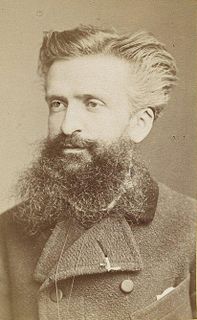Top 192 Hermit Crabs Quotes & Sayings - Page 4
Explore popular Hermit Crabs quotes.
Last updated on April 20, 2025.
At the bidding of a Peter the Hermit millions of men hurled themselves against the East; the words of an hallucinated enthusiast such as Mahomet created a force capable of triumphing over the Graeco-Roman world; an obscure monk like Luther bathed Europe in blood. The voice of a Galileo or a Newton will never have the least echo among the masses. The inventors of genius hasten the march of civilization. The fanatics and the hallucinated create history.
And then you came along and you spoke to me and nobody had looked me in the eye for years. (...) But I remember you that day and you looked at peace with yourself and it made me reconsider everything I had planned to do. Because I thought to myself, you can't do this to her, not after the Hermit thing." "Do what to me? I don't think leaving me on that platform would have changed my life, Griggs," I lie. "You being on that platform changed mine.
Yes. They are the words that finally turned me into the hermit I have now become. It was quite sudden. I saw them, and I knew what I had to do." The sign read: "Hold stick near center of its length. Moisten pointed end in mouth. Insert in tooth space, blunt end next to gum. Use gentle in-out motion." "It seemed to me," said Wonko the Sane, "that any civilization that had so far lost its head as to need to include a set of detailed instructions for use in a package of toothpicks, was no longer a civilization in which I could live and stay sane.
I am interested in people, and I am interested enough in people that I want to be friends with a lot of people and know about their lives. So I'm not a hermit. I'm also interested in writing about other things. It goes on and on. I sometimes wish that I had a different personality. But then I would write different types of books.
I really would like to stop working forever–never work again, never do anything like the kind of work I’m doing now–and do nothing but write poetry and have leisure to spend the day outdoors and go to museums and see friends. And I’d like to keep living with someone — maybe even a man — and explore relationships that way. And cultivate my perceptions, cultivate the visionary thing in me. Just a literary and quiet city-hermit existence.
I think theoretically if a man is young and healthy society should not give him a basic income. He should not be given dole. He should not be eligible for welfare. If he can work and if there is work available, he should take his choice. If he wants to be a hermit or beggar, that's fine. If he wants to move with the sun and live off the land, that's fine. If he is in a society which has work for him I don't think he should theoretically be eligible for welfare.
Eating alone is a disappointment. But not eating matter more, is hollow and green, has thorns like a chain of fish hooks, trailing from the heart, clawing at your insides. Hunger feels like pincers, like the bite of crabs; it burns, burns, and has no fur. Let us sit down soon to eat with all those who haven't eaten; let us spread great tablecloths, put salt in lakes of the world, set up planetary bakeries, tables with strawberries in snow, and a plate like the moon itself from which we can all eat. For now I ask no more than the justice of eating.
I'm a 48-year-old writer who can remember being a 10-year-old writer and who expects someday to be an 80-year-old writer. I'm also comfortably asocial -- a hermit in the middle of Los Angeles -- a pessimist if I'm not careful, a feminist, a Black, a former Baptist, an oil-and-water combination of ambition, laziness, insecurity, certainty, and drive.
She had been living like a hermit herself, in a cramped, seedy apartment in Somerville, spending long hours in the lab. All-nighters had become a regular thing. She didn't have any close friends, didn't go out on dates, didn't even go to the movies by herself. She had sacrificed a normal life in order to get a PhD, and become a scientist.
Loneliness is necessary for pure poetry. When someone intrudes into the poet's life (and any sudden personal contact, whether in the bed or in the heart, is an intrusion) the poet loses his or her balance for a moment, slips into being what he or she is, uses his or her poetry as one would use money or sympathy. The person who writes the poetry emerges, tentatively, like a hermit crab from a conch shell. The poet, for that instant, ceases to be a dead person.
Brian Myers takes a fresh approach. He largely ignores what the regime tells the outside world about itself, but concentrates instead on what North Koreans themselves are supposed to believe, paying special attention to the North Korean narratives and mass culture, including movies and television shows. (...) There are few books that can give the world a peek into the Hermit Kingdom. The Cleanest Race provides a reason to care about how those in North Korea see themselves and the West. It is possibly the best addition to that small library.
If I were to choose the sights, the sounds, the fragrances I most would want to see and hear and smell--among all the delights of the open world--on a final day on earth, I think I would choose these: the clear, ethereal song of a white-throated sparrow singing at dawn; the smell of pine trees in the heat of the noon; the lonely calling of Canada geese; the sight of a dragon-fly glinting in the sunshine; the voice of a hermit thrush far in a darkening woods at evening; and--most spiritual and moving of sights--the white cathedral of a cumulus cloud floating serenely in the blue of the sky.











